Key takeaways:
- Anti-war activism is driven by empathy, emphasizing the importance of connecting with personal stories to understand the human impact of war.
- Direct storytelling and participatory activities are effective strategies for fostering empathy and breaking down cultural barriers.
- Engaging with global communities and building supportive networks are crucial for amplifying voices and facilitating collective action for peace.
- The lessons learned in activism highlight the significance of listening, adaptability, and the power of storytelling to inspire change and bridge divides.
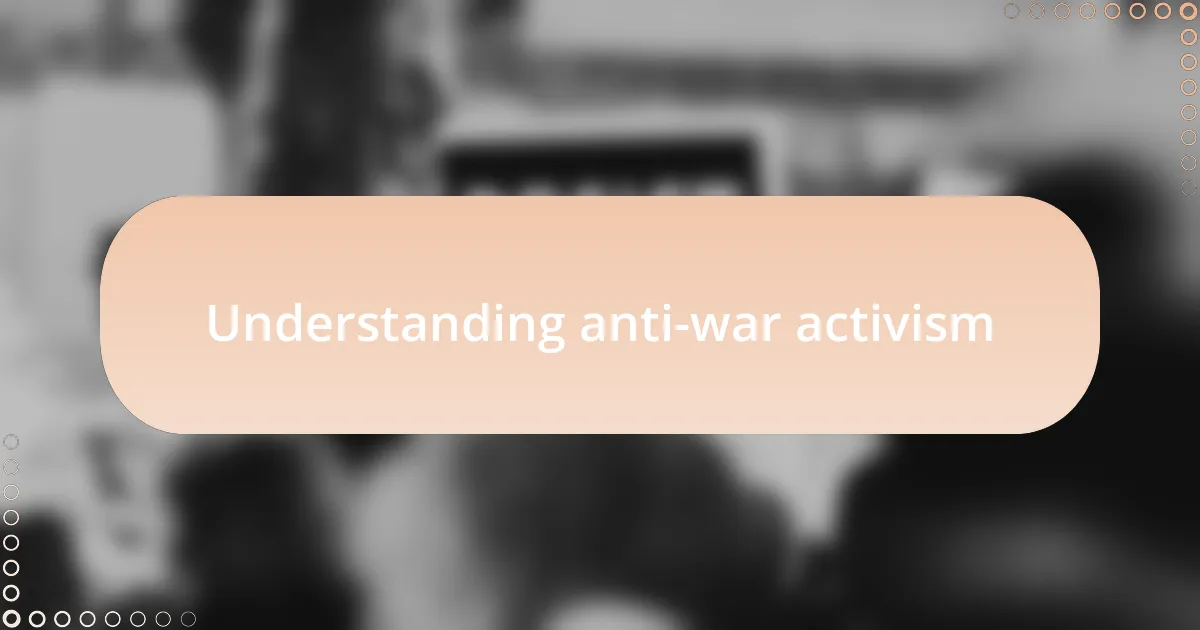
Understanding anti-war activism
Anti-war activism is rooted in the profound belief that every human life matters, transcending borders and nationalities. I vividly remember attending a rally where a mother shared her story about losing her son to a conflict that seemed so distant to many of us. It struck me then—how can we not consider the personal tragedies that occur in the wake of war?
Many activists view war not just as a political or economic issue, but as a deeply human one that affects families, communities, and generations. I often ponder this: what if we took a moment to visualize the lives we are advocating for? Imagining the daily joys and struggles of those living in war-affected areas can foster a deeper connection and drive our efforts.
The conversations within anti-war circles can be emotionally charged, but they are crucial for understanding the far-reaching consequences of violence. I recall a local meeting where we discussed the stories of refugees—tales of resilience intertwined with loss. Hearing these firsthand accounts fueled my passion and commitment to the movement, reminding me that empathy is not just an abstract concept; it’s a necessary catalyst for action.
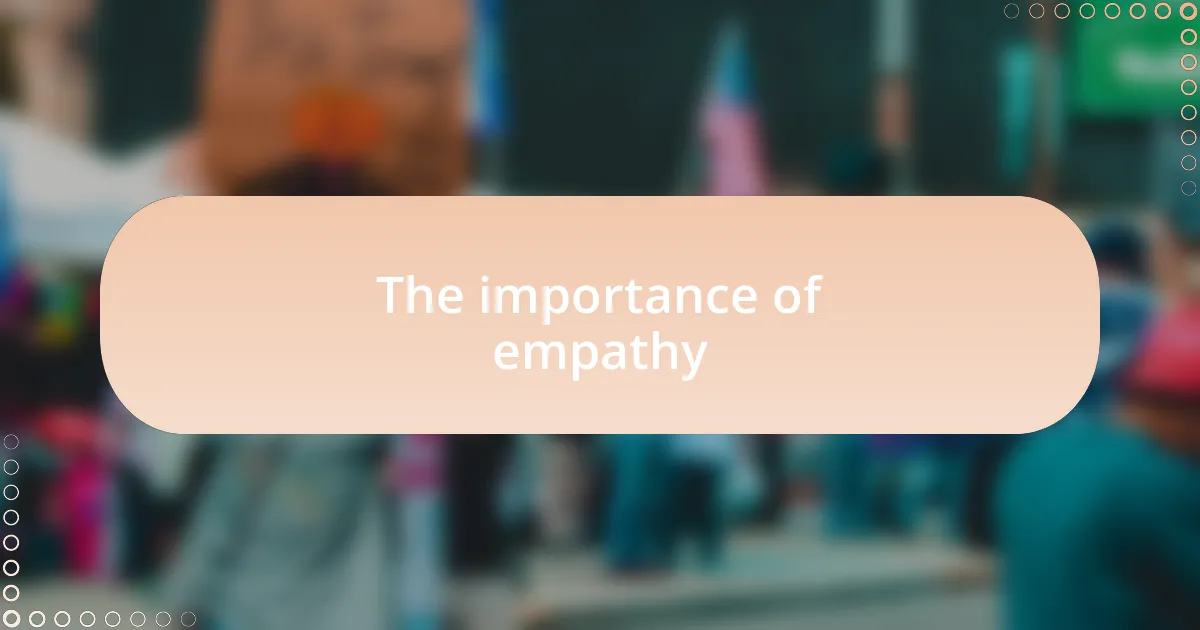
The importance of empathy
Empathy serves as the bridge that connects us to the experiences of others, especially those ensnared in the turmoil of war. I remember a conversation with a friend who had volunteered in a refugee camp. As she described her encounters with individuals who had fled violence, I felt my heart ache at the thought of their unbearable loss. Isn’t it our shared humanity that compels us to lend our voices to those who are often silenced?
In my view, empathy allows us to transcend geographical boundaries and truly understand the pain of others. I once watched a poignant documentary featuring children from war-torn regions, their laughter juxtaposed against the backdrop of devastation. That stark contrast made me realize: how can we ignore their plight when their innocence is lost in conflict? Moments like these remind me that empathy can transform our perceptions and inspire us to take meaningful action.
Embracing empathy also fuels our collective resolve to manifest peace. I vividly recall participating in an online forum where individuals from diverse backgrounds shared their thoughts on war and its effects. The exchange of ideas opened my eyes to countless perspectives, leaving me with a burning question: what more can I do to advocate for those who suffer? This sense of interconnectedness reaffirms my belief that through empathy, we can ignite a powerful movement for change, driving us toward a world where compassion prevails over conflict.
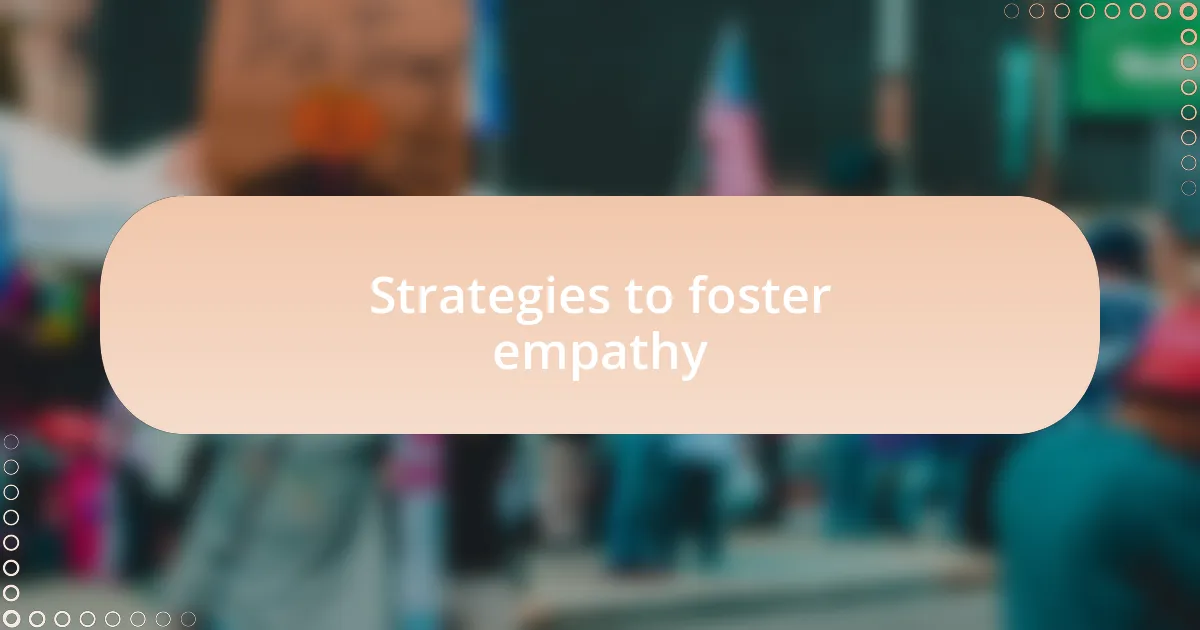
Strategies to foster empathy
One effective strategy to foster empathy is through direct storytelling. I remember attending a local event where refugees shared their personal narratives. Listening to their stories—filled with heartbreak and resilience—opened my heart in ways I had never anticipated. Isn’t it fascinating how a single story can change our understanding and inspire a deeper emotional connection?
Another powerful approach is participatory activities, like cultural immersion experiences. I participated in a community project where we collaborated with people from different backgrounds, learning about their customs and traditions. Engaging in these shared experiences allows us to break down barriers and cultivate a genuine appreciation for each other’s lives. Have you ever tried something similar? Those moments enrich our empathy and broaden our worldview.
Lastly, leveraging social media can amplify empathetic voices across borders. I recall reading a heartfelt post from a journalist in a conflict zone, capturing the daily struggles and hopes of the people there. This compelled me to comment and share, creating a ripple effect. Isn’t social media meant to unite us? By amplifying these stories, we can inspire others to reflect on their own perspectives and cultivate empathy on a global scale.
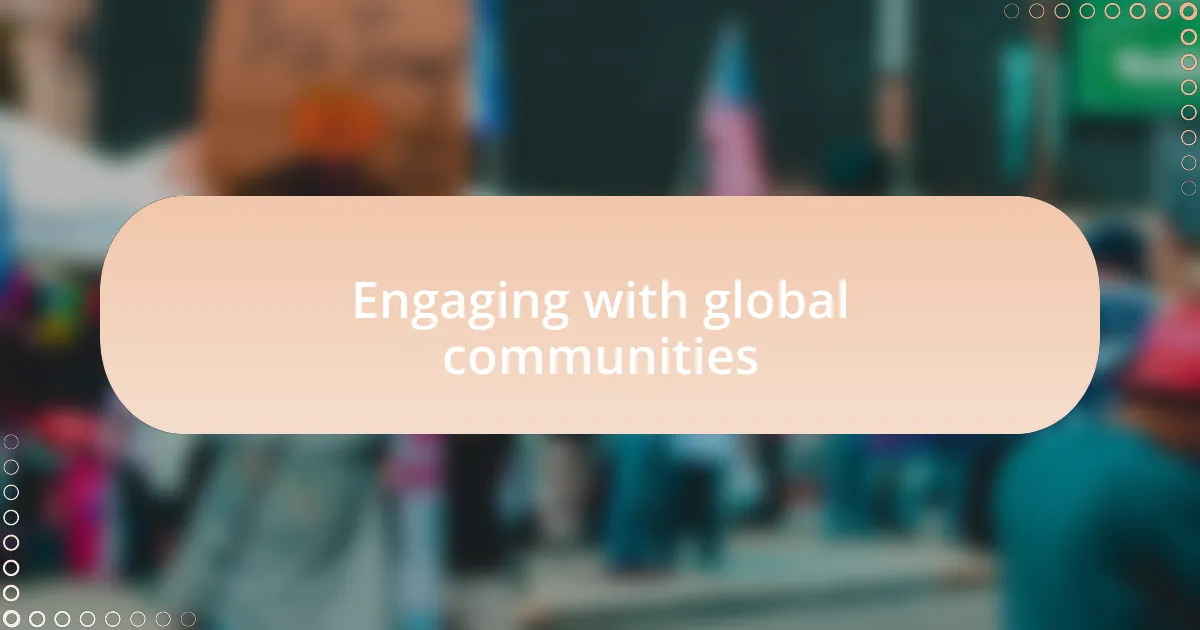
Engaging with global communities
Engaging with global communities requires a genuine desire to connect beyond our immediate surroundings. I vividly recall a virtual forum I joined, which brought together activists from various countries. As we shared our experiences, I realized that our struggles, though different in context, resonated deeply on a human level—each story a thread binding us together. Have you ever felt that electric connection when you discover shared hopes amid differing backgrounds?
Participating in international collaborations has shown me how powerful collective action can be. I remember joining an online art project where artists from around the globe responded to themes of peace and conflict. The conversations sparked by our creations opened my eyes to the diverse ways we express our longing for harmony. How often do we overlook the beauty in different perspectives that can unite us in our shared humanity?
Moreover, reaching out to global youth organizations has been incredibly rewarding. I volunteered with a group that organizes international exchanges for young leaders. Witnessing the transformation in participants—once unsure of their ability to engage with others, now passionate advocates for change—filled me with hope. Isn’t it inspiring to see how young people can become bridges across cultural divides, carrying forward a message of empathy?
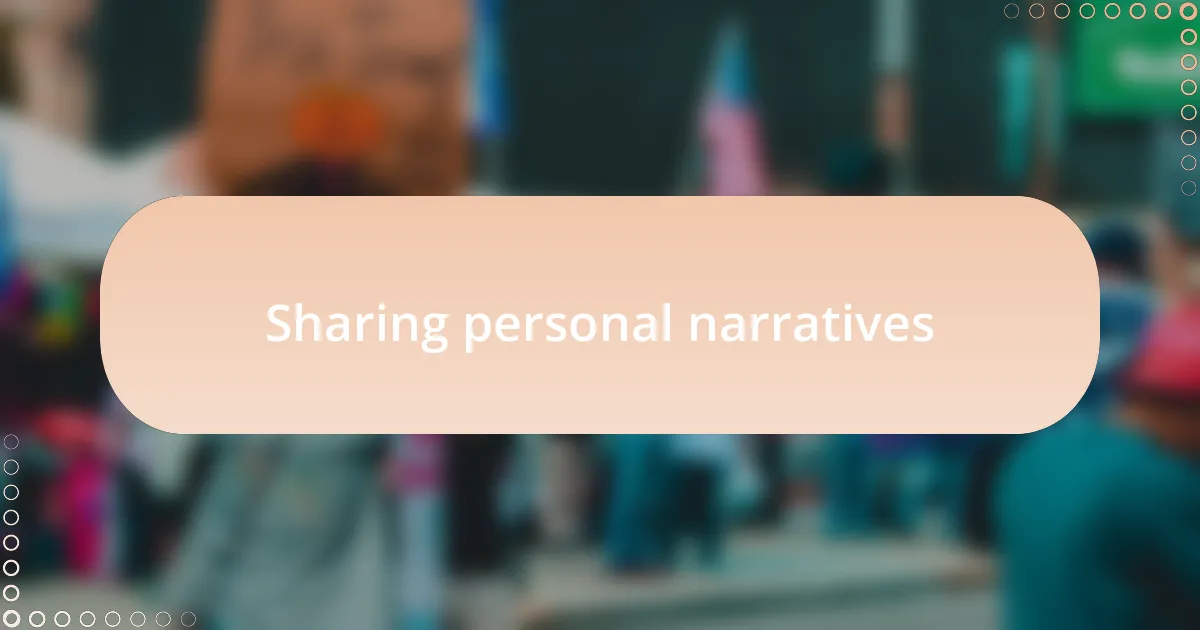
Sharing personal narratives
Sharing personal narratives can be a profoundly moving experience that creates a tapestry of understanding. I once participated in a project where individuals from conflict zones shared their stories of loss and resilience. Listening to a mother recount her struggle to find safety for her children made the distance between us melt away. How can we not feel the weight of another’s pain when they speak so candidly?
As I’ve exchanged stories with people across borders, I’ve found that vulnerability fosters connection. There was a moment during a workshop where a young woman revealed her fears of being marginalized in her own country. Her words, so raw and relatable, echoed my own experiences, reminding me that we all crave acceptance and belonging. In what ways do our shared vulnerabilities allow us to break down the walls that divide us?
I vividly remember sharing my own journey of activism during an online gathering, where I sought to inspire others with my passion for peace. The response was overwhelming; people from different cultures reached out, sharing how my story sparked hope in their own struggles. Isn’t it amazing how one narrative can ignite a ripple effect, inspiring empathy and action across the globe?
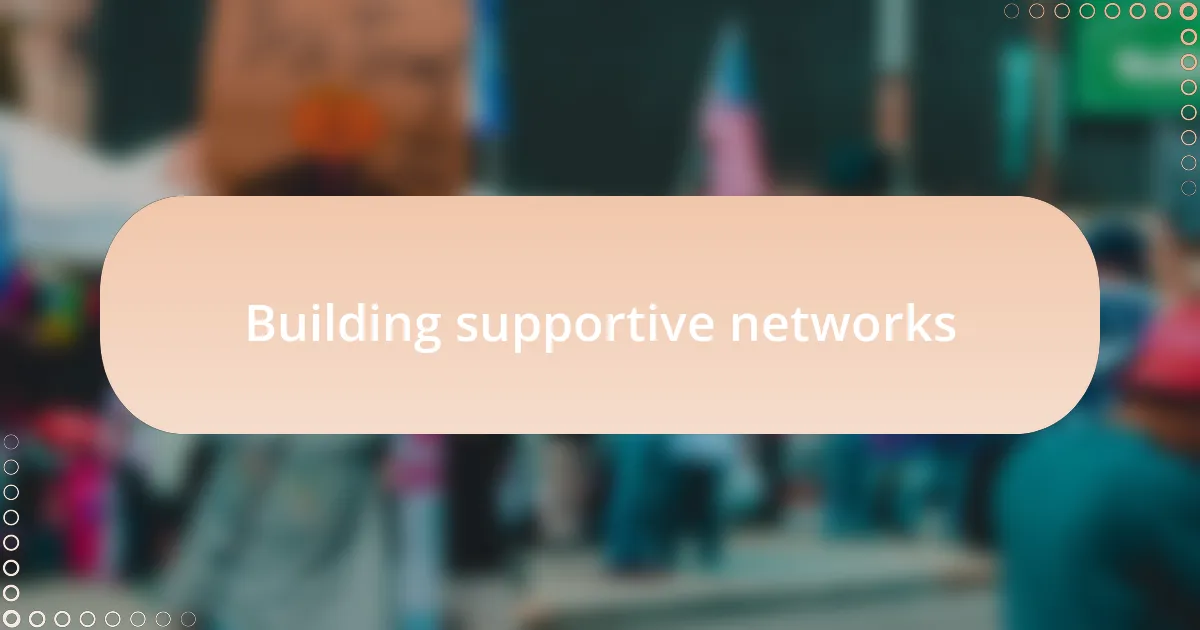
Building supportive networks
Building supportive networks often starts with recognizing the shared struggles we face as human beings. I recall a time when I joined a grassroots organization focused on peace-building, where I met kindred spirits committed to fostering empathy. Our diverse backgrounds created a rich discourse, and it struck me how gathering like-minded individuals could transform distant hopes into collective actions. Have you ever felt the power of joining a community that shares your vision for a better world?
In one particular meeting, we brainstormed ways to reach out to individuals affected by war. I was overwhelmed by the creativity and passion my peers brought to the table. It was exhilarating to realize that, together, we could amplify each other’s voices. Isn’t it incredible how networking, built on trust and mutual support, can empower us to make a larger impact than we could alone?
One of my most rewarding experiences involved collaborating with an international group, where our conversations revealed deep emotional links despite cultural differences. I remember discussing a simple yet profound idea: creating online spaces for open dialogue. The connections we formed—fueled by empathy and curiosity—led us to plan events that celebrated our shared humanity. How often do we overlook the magic that happens when we connect on a deeper level?
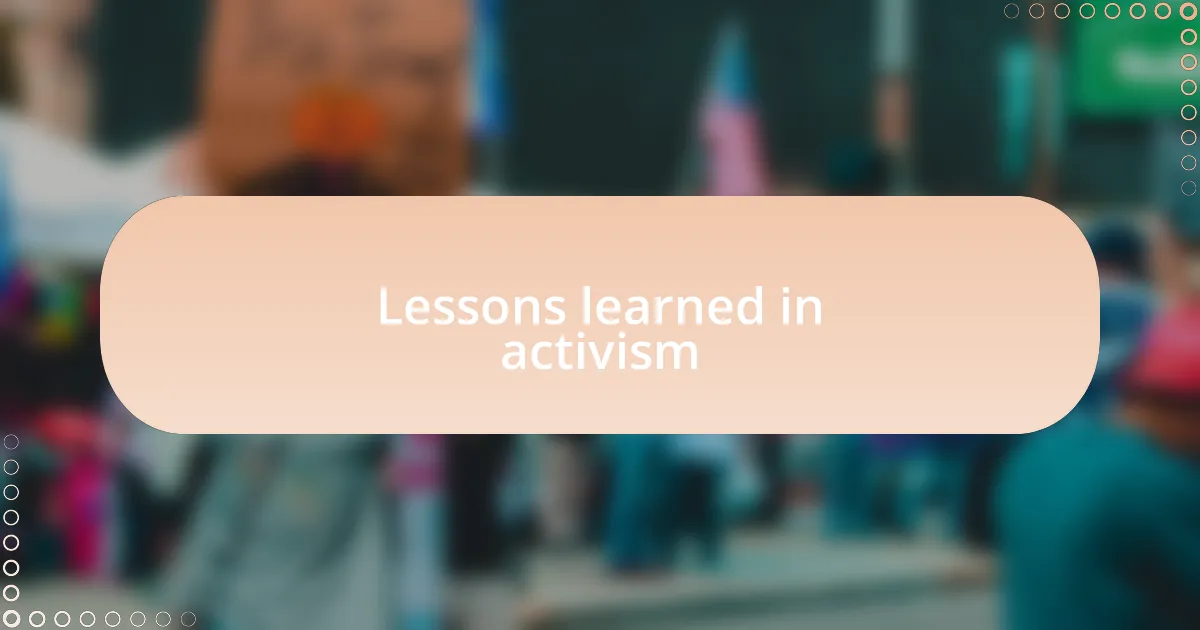
Lessons learned in activism
One lesson I’ve taken away from my time in activism is the importance of listening—truly listening. In a project aimed at bringing together displaced individuals from different regions, I learned that empathy starts with understanding someone else’s story. I vividly remember sitting around a table, listening to a woman recount her harrowing escape from conflict; her pain was palpable, and it reminded me how crucial it is to create safe spaces for others to share their experiences. Have you ever noticed how a simple act of listening can bridge divides?
Another key lesson I’ve learned is to remain adaptable in our approaches. There was a point when I tried to implement a rigid strategy for a campaign, but it quickly became clear that the needs of the community were shifting. The moment I let go of my predefined notions and asked for input from community members, I witnessed a transformation; our efforts became more authentic and effective. Isn’t it fascinating how flexibility can open doors to solutions we might not have originally considered?
Lastly, I’ve come to appreciate the power of storytelling in our activism. One instance that stands out involved sharing testimonies from war survivors through social media. The raw emotions expressed not only resonated with audiences but stirred a call to action among those who might have felt disconnected from the issues. Have you ever found that your own stories have the ability to inspire change? It’s a testament to how vulnerability can unite us in our fight for peace.